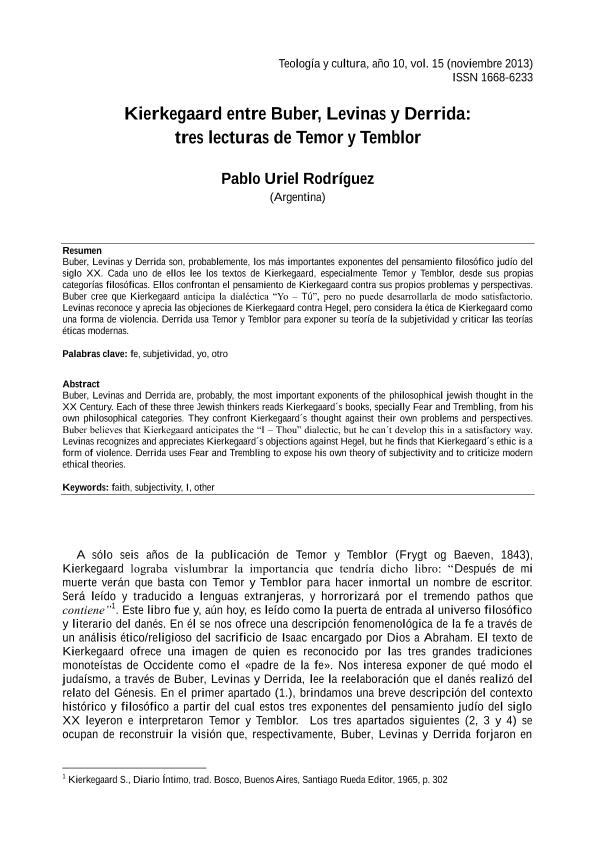Mostrar el registro sencillo del ítem
dc.contributor.author
Rodríguez, Pablo Uriel

dc.date.available
2017-11-15T13:06:05Z
dc.date.issued
2013-10
dc.identifier.citation
Rodríguez, Pablo Uriel; Kierkegaard entre Buber, Levinas y Derrida: tres lecturas de "Temor y Temblor"; A. F. Roldán; Teología y Cultura; 15; 10-2013; 69-90
dc.identifier.issn
1668-6233
dc.identifier.uri
http://hdl.handle.net/11336/28204
dc.description.abstract
Buber, Levinas y Derrida son, probablemente, los más importantes exponentes del pensamiento filosófico judío del siglo XX. Cada uno de ellos lee los textos de Kierkegaard, especialmente Temor y Temblor, desde sus propias categorías filosóficas. Ellos confrontan el pensamiento de Kierkegaard contra sus propios problemas y perspectivas. Buber cree que Kierkegaard anticipa la dialéctica “Yo – Tú”, pero no puede desarrollarla de modo satisfactorio. Levinas reconoce y aprecia las objeciones de Kierkegaard contra Hegel, pero considera la ética de Kierkegaard como una forma de violencia. Derrida usa Temor y Temblor para exponer su teoría de la subjetividad y criticar las teorías éticas modernas.
dc.description.abstract
Buber, Levinas and Derrida are, probably, the most important exponents of the philosophical jewish thought in the XX Century. Each of these three Jewish thinkers reads Kierkegaard´s books, specially Fear and Trembling, from his own philosophical categories. They confront Kierkegaard´s thought against their own problems and perspectives. Buber believes that Kierkegaard anticipates the “I – Thou” dialectic, but he can´t develop this in a satisfactory way. Levinas recognizes and appreciates Kierkegaard´s objections against Hegel, but he finds that Kierkegaard´s ethic is a form of violence. Derrida uses Fear and Trembling to expose his own theory of subjectivity and to criticize modern ethical theories.
dc.format
application/pdf
dc.language.iso
spa
dc.publisher
A. F. Roldán
dc.rights
info:eu-repo/semantics/openAccess
dc.rights.uri
https://creativecommons.org/licenses/by-nc-sa/2.5/ar/
dc.subject
Kierkegaard
dc.subject
Judaísmo
dc.subject
Temor y Temblor
dc.subject.classification
Estudios Religiosos

dc.subject.classification
Filosofía, Ética y Religión

dc.subject.classification
HUMANIDADES

dc.title
Kierkegaard entre Buber, Levinas y Derrida: tres lecturas de "Temor y Temblor"
dc.type
info:eu-repo/semantics/article
dc.type
info:ar-repo/semantics/artículo
dc.type
info:eu-repo/semantics/publishedVersion
dc.date.updated
2017-11-13T19:57:44Z
dc.journal.volume
15
dc.journal.pagination
69-90
dc.journal.pais
Argentina

dc.journal.ciudad
Ramos Mejía
dc.description.fil
Fil: Rodríguez, Pablo Uriel. Universidad de Morón; Argentina. Consejo Nacional de Investigaciones Científicas y Técnicas; Argentina
dc.journal.title
Teología y Cultura
dc.relation.alternativeid
info:eu-repo/semantics/altIdentifier/url/http://www.teologiaycultura.com.ar/vol_15.htm
dc.relation.alternativeid
info:eu-repo/semantics/altIdentifier/url/http://www.teologiaycultura.com.ar/arch_rev/vol_15/005_RODRIGUEZ,%20PABLO_SK_pensadores_judios.pdf
Archivos asociados
